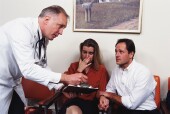- Are You Making This Expensive Thermostat Error This Winter?
- Recognizing the Signs of Hypothyroidism
- 10 Strategies to Overcome Insomnia
- Could Artificial Sweeteners Be Aging the Brain Faster?
- Techniques for Soothing Your Nervous System
- Does the Water in Your House Smell Funny? Here’s Why
- Can a Daily Dose of Apple Cider Vinegar Actually Aid Weight Loss?
- 6 Health Beverages That Can Actually Spike Your Blood Sugar
- Treatment Options for Social Anxiety Disorder
- Understanding the Connection Between Anxiety and Depression
Transplant Expert Dispels Organ Donation Misconceptions


Misconceptions prevent many people from agreeing to donate their organs and potentially save a life, according to a transplant expert.
More than 120,000 people are on organ transplant waiting lists in the United States. But a shortage of donated organs means that an average of 18 people die each day while waiting for transplants.
For every person who donates their organs after they die, the lives of up to 50 people could be saved or improved, according to a Mayo Clinic news release.
As part of National Donate Life Month in April, Dr. Brooks Edwards outlines and dispels the myths that get in the way of organ donation. He is a transplant cardiologist and director of the Mayo Clinic’s Center for Transplantation and Clinical Regeneration.
Some people mistakenly believe that if they agree to donate their organs, doctors won’t work as hard to save their life. The fact is that doctors will do all they can to save your life, Edwards said in a Mayo news release.
Other people believe that organ donation is against their religion. But Edwards said that organ donation is consistent with the beliefs of most major religions, including Roman Catholicism, Islam, most Protestant faiths and most branches of Judaism. If you have doubts or concerns, speak with a member of your clergy, he advised.
There are also those who think that people who’ve donated organs or tissues can’t have an open-casket funeral. Since a person’s body is clothed for burial, there are no visible signs of organ or tissue donation, Edwards explained.
Some believe they are too old or sick to donate their organs. But the decision to use your organs is based on medical criteria, not age. Also, only a few health conditions automatically disqualify people from donating organs. Sign up to be an organ donor and let doctors decide after you die whether your organs and tissues can be used for transplantation, Edwards suggested.
Another misconception is that rich and famous people go to the top of the list when they need a donor organ. But they don’t receive preferential treatment, and fame and wealth aren’t considered when deciding who gets an organ, Edwards said.
More information
The U.S. National Library of Medicine has more about organ donation.
Source: HealthDay
Copyright © 2026 HealthDay. All rights reserved.










